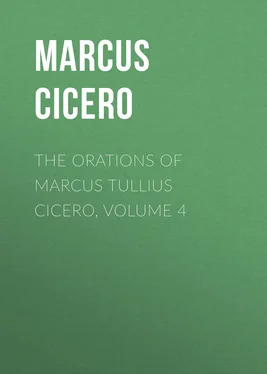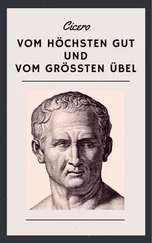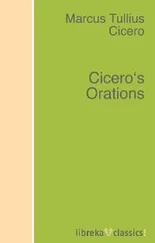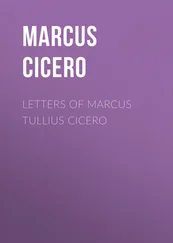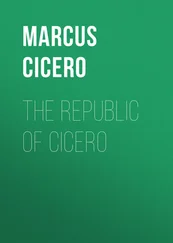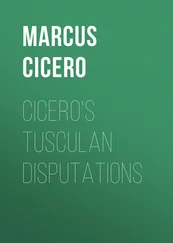Marcus Cicero - The Orations of Marcus Tullius Cicero, Volume 4
Здесь есть возможность читать онлайн «Marcus Cicero - The Orations of Marcus Tullius Cicero, Volume 4» — ознакомительный отрывок электронной книги совершенно бесплатно, а после прочтения отрывка купить полную версию. В некоторых случаях можно слушать аудио, скачать через торрент в формате fb2 и присутствует краткое содержание. Жанр: foreign_antique, Философия, foreign_edu, на английском языке. Описание произведения, (предисловие) а так же отзывы посетителей доступны на портале библиотеки ЛибКат.
- Название:The Orations of Marcus Tullius Cicero, Volume 4
- Автор:
- Жанр:
- Год:неизвестен
- ISBN:нет данных
- Рейтинг книги:3 / 5. Голосов: 1
-
Избранное:Добавить в избранное
- Отзывы:
-
Ваша оценка:
- 60
- 1
- 2
- 3
- 4
- 5
The Orations of Marcus Tullius Cicero, Volume 4: краткое содержание, описание и аннотация
Предлагаем к чтению аннотацию, описание, краткое содержание или предисловие (зависит от того, что написал сам автор книги «The Orations of Marcus Tullius Cicero, Volume 4»). Если вы не нашли необходимую информацию о книге — напишите в комментариях, мы постараемся отыскать её.
The Orations of Marcus Tullius Cicero, Volume 4 — читать онлайн ознакомительный отрывок
Ниже представлен текст книги, разбитый по страницам. Система сохранения места последней прочитанной страницы, позволяет с удобством читать онлайн бесплатно книгу «The Orations of Marcus Tullius Cicero, Volume 4», без необходимости каждый раз заново искать на чём Вы остановились. Поставьте закладку, и сможете в любой момент перейти на страницу, на которой закончили чтение.
Интервал:
Закладка:
VI. Wherefore, I will embrace every consideration in my opinion which I am now going to deliver, a course to which you, I feel sure, have no objection, in order that authority may be conferred by us on admirable generals, and that hope of reward may be held out by us to gallant soldiers, and that a formal decision may be come to, not by words only, but also by actions, that Antonius is not only not a consul, but is even an enemy. For if he be consul, then the legions which have deserted the consul deserve beating 24 24 Riddle (Dict. Lat. in voce) says, that this was the regular punishment for deserters, and was inflicted by their comrades.
to death. Caesar is wicked, Brutus is impious, since they of their own heads have levied an army against the consul. But if new honours are to be sought out for the soldiers on account of their divine and immortal merits, and if it is quite impossible to show gratitude enough to the generals, who is there who must not think that man a public enemy, whose conduct is such that those who are in arms against him are considered the saviours of the republic?
Again, how insulting is he in his edicts! how ignorant! How like a barbarian! In the first place, how has he heaped abuse on Caesar, in terms drawn from his recollection of his own debauchery and profligacy. For where can we find any one who is chaster than this young man? who is more modest? where have we among our youth a more illustrious example of the old-fashioned strictness? Who, on the other hand, is more profligate than the man who abuses him? He reproaches the son of Caius Caesar with his want of noble blood, when even his natural 25 25 Cnaeus Octavius, the real father of Octavius Caesar, had been praetor and governor of Macedonia, and was intending to stand for the consulship when he died.
father, if he had been alive, would have been made consul. His mother is a woman of Aricia. You might suppose he was saying a woman of Tralles, or of Ephesus. Just see how we all who come from the municipal towns—that is to say, absolutely all of us—are looked down upon; for how few of us are there who do not come from those towns? and what municipal town is there which he does not despise who looks with such contempt on Aricia; a town most ancient as to its antiquity; if we regard its rights, united with us by treaty; if we regard its vicinity, almost close to us; if we regard the high character of its inhabitants, most honourable? It is from Aricia that we have received the Voconian and Atinian laws; from Aricia have come many of those magistrates who have filled our curule chairs, both in our fathers' recollection and in our own; from Aricia have sprung many of the best and bravest of the Roman knights. But if you disapprove of a wife from Aricia, why do you approve of one from Tusculum? Although the father of this most virtuous and excellent woman, Marcus Atius Balbus, a man of the highest character, was a man of praetorian rank; but the father of your wife,—a good woman, at all events a rich one,—a fellow of the name of Bambalio, was a man of no account at all. Nothing could be lower than he was, a fellow who got his surname as a sort of insult, derived 26 26 Bambalio is derived from the Greek word [Greek: bambala] to lisp.
from the hesitation of his speech and the stolidity of his understanding. Oh, but your grandfather was nobly born. Yes, he was that Tuditanus who used to put on a cloak and buskins, and then go and scatter money from the rostra among the people. I wish he had bequeathed his contempt of money to his descendants! You have, indeed, a most glorious nobility of family! But how does it happen that the son of a woman of Aricia appears to you to be ignoble, when you are accustomed to boast of a descent on the mother's side which is precisely the same? 27 27 Julia, the mother of Antonius and sister of Lucius Caesar, was also a native of Aricia.
Besides, what insanity is it for that man to say anything about the want of noble birth in men's wives, when his father married Numitoria of Fregellae, the daughter of a traitor, and when he himself has begotten children of the daughter of a freedman. However, those illustrious men Lucius Philippus, who has a wife who came from Aricia, and Caius Marcellus, whose wife is the daughter of an Arician, may look to this; and I am quite sure that they have no regrets on the score of the dignity of those admirable women.
VII. Moreover, Antonius proceeds to name Quintus Cicero, my brother's son, in his edict; and is so mad as not to perceive that the way in which he names him is a panegyric on him. For what could happen more desirable for this young man, than to be known by every one to be the partner of Caesar's counsels, and the enemy of the frenzy of Antonius? But this gladiator has dared to put in writing that he had designed the murder of his father and of his uncle. Oh the marvellous impudence, and audacity, and temerity of such an assertion! to dare to put this in writing against that young man, whom I and my brother, on account of his amiable manners, and pure character, and splendid abilities, vie with one another in loving, and to whom we incessantly devote our eyes, and ears, and affections! And as to me, he does not know whether he is injuring or praising me in those same edicts. When he threatens the most virtuous citizens with the same punishment which I inflicted on the most wicked and infamous of men, he seems to praise me as if he were desirous of copying me; but when he brings up again the memory of that most illustrious exploit, then he thinks that he is exciting some odium against me in the breasts of men like himself.
VIII. But what is it that he has done himself? When he had published all these edicts, he issued another, that the senate was to meet in a full house on the twenty-fourth of November. On that day he himself was not present. But what were the terms of his edict? These, I believe, are the exact words of the end of it: "If any one fails to attend, all men will be at liberty to think him the adviser of my destruction and of most ruinous counsels". What are ruinous counsels? those which relate to the recovery of the liberty of the Roman people? Of those counsels I confess that I have been and still am an adviser and prompter to Caesar. Although he did not stand in need of any one's advice, but still I spurned on the willing horse, as it is said. For what good man would not have advised putting you to death, when on your death depended the safety and life of every good man, and the liberty and dignity of the Roman people?
But when he had summoned us all by so severe an edict, why did he not attend himself? Do you suppose that he was detained by any melancholy or important occasion? He was detained drinking and feasting. If, indeed, it deserves to be called a feast, and not rather gluttony. He neglected to attend on the day mentioned in his edict, and he adjourned the meeting to the twenty-eighth. He then summoned us to attend in the Capitol, and at that temple he did arrive himself, coming up through some mine left by the Gauls. Men came, having been summoned, some of them indeed men of high distinction, but forgetful of what was due to their dignity. For the day was such, the report of the object of the meeting such, such too the man who had convened the senate, that it was discreditable for a senate to feel no fear for the result. And yet to those men who had assembled he did not dare to say a single word about Caesar, though he had made up his mind 28 28 He had intended to propose to the senate to declare Octavius a public enemy. We must recollect that in these orations Cicero, even when he speaks of Caius Caesar, means Octavius.
to submit a motion respecting him to the senate. There was a man of consular rank who had brought a resolution ready drawn up. Is it not now admitting that he is himself an enemy, when he does not dare to make a motion respecting a man who is leading an army against him while he is consul? For it is perfectly plain that one of the two must be an enemy, nor is it possible to come to a different decision respecting adverse generals. If then Caius Caesar be an enemy, why does the consul submit no motion to the senate? If he does not deserve to be branded by the senate, then what can the consul say, who, by his silence respecting him, has confessed that he himself is an enemy? In his edicts he styles him Spartacus, while in the senate he does not venture to call him even a bad citizen.
Интервал:
Закладка:
Похожие книги на «The Orations of Marcus Tullius Cicero, Volume 4»
Представляем Вашему вниманию похожие книги на «The Orations of Marcus Tullius Cicero, Volume 4» списком для выбора. Мы отобрали схожую по названию и смыслу литературу в надежде предоставить читателям больше вариантов отыскать новые, интересные, ещё непрочитанные произведения.
Обсуждение, отзывы о книге «The Orations of Marcus Tullius Cicero, Volume 4» и просто собственные мнения читателей. Оставьте ваши комментарии, напишите, что Вы думаете о произведении, его смысле или главных героях. Укажите что конкретно понравилось, а что нет, и почему Вы так считаете.
